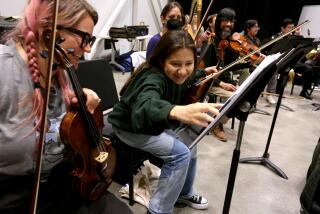MUSIC REVIEW : Plenty to Smile About When Dutton Takes Stage
- Share via
SAN DIEGO — If it’s possible to play the tuba tongue-in-cheek, Brent Dutton is the one to do it.
Composer, tuba player and professor of music at San Diego State University, he possesses a keen humor, which he incorporates into his performing, his compositions and his chatty program notes.
A selection of Dutton’s music, composed for solo tuba, brass quintet, trio and a 30-person brass ensemble, was performed Tuesday at Smith Recital Hall on the SDSU campus. Performing were four brass quintets from Southern California--San Diego Brass Consort, Westwind Brass, Premiere Brass and Voortrekker Brass Quintet--plus 11 additional brass players and pianist Wendy Ford.
The 41-year-old Dutton began writing music when he was 12. Evident in the music heard Tuesday--compositions spanning 1968 to 1991--is an affection for brass and a seemingly empathic understanding of the brass musician’s capacity, both in solo and ensemble playing.
Employing traditional approaches and off-beat extended techniques, Dutton shows off the instruments--trumpets, trombones, horns, tubas--with an egalitarian sensibility. He never loses his listener by indulging in personal improvisational ruminations or by so taxing his players that the quality of performance suffers. Performance quality was high throughout the six works presented.
Dutton’s tightly structured pieces also revealed an interest in the mind-bending experiments of contemporary music theory, which he both seriously explores and gently mocks. All heard, his retrospective was musically satisfying.
“Openings,” which used the forces of 30 brass musicians--a large ensemble on stage, two quintets seated on each side of the orchestra pit and several performers lining the perimeter of the hall--appropriately opened the recital.
For roughly 15 minutes, this truly brazen work released--like tiny time capsules--phrases from well-known brass quintet openings (such as the one used to open PBS’s television series “Masterpiece Theater”) into a “bath” (Dutton’s word) of flutterings, mutterings, sustained chords and piercing assaults. The finale, an ear-drum numbing crescendo, scorched every last air molecule in the hall, much to the approval of the 60 or so in the audience, many of them students.
“Brass Trio,” three short pieces (1968-1971) performed by three musicians--John Wilds on trumpet, Bill Yeager on trombone, and the composer on tuba--featured a melancholy study and a brisk, almost pushy march, with a funny centerpiece titled “Squelch.” In listening to “Squelch,” a work of detached blasts, buzzing and instrumental exchanges having the rhythmic character of a silly conversation, one thinks, “This has a lot of character.” As it turns out, Dutton wrote it as a birthday present, obviously with tongue deeply into cheek, for Spiro T. Agnew, vice president at the time.
Not all of his music had comical elements. The somber “Short Piece and Variations,” written for a sextet, avoided the disintegrated brittleness of many such 12-tone compositions, and consequently remained interesting throughout.
And the premiere of the “On a Darkling Plain” (1991) was wholly accessible, even at its most dissonant. Rich in drama, dense contrasts, fierce scramblings and muted prayers floating in the distance, the work, as Dutton explained in his program notes, is music for dreams that occur before momentous events.
Dutton chose the dreams of mythic figures of the English Dark Ages--King Arthur, the 1st Century warrior queen Boadicea, and King Alfred--”before they went forth to meet their own Armageddon,” and the result was, paradoxically, an exciting meditation, not unlike dreams.
“On a Darkling Plain” was expertly executed by the Westwind Brass, which commissioned it.
More to Read
The biggest entertainment stories
Get our big stories about Hollywood, film, television, music, arts, culture and more right in your inbox as soon as they publish.
You may occasionally receive promotional content from the Los Angeles Times.










